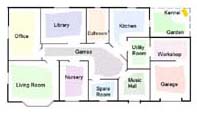CHOOSING A
BOILER
Choosing the right Boiler for your Home
Choosing the right boiler depends on your property and individual needs. Some important factors to consider:
- Position – wall hung or floor-standing models are available. The boilers distance from an outside wall or the roof will affect the type of flue you have (‘ Open ' or ‘ Room-sealed' ).
- Size of household – for example, does your boiler need to supply heating and hot water for a number of bathrooms?
- Running costs - look for energy rating labels to compare costs.
- Maintenance – some boilers require stringent servicing than others.
- Safety - all boilers require a regular service by a qualified professional. It is a legal requirement for
gas boilers
to be inspected by a qualified GAS SAFE engineer annually. Boilers or flues must not be altered without seeking expert advice. Check out this gas boiler inspection information.
Pro's and Con's of Boiler Options
Traditional Boiler
A cast iron heat exchanger heats the water, similar to a gas burner under a kettle.
Pros:
- operates quietly and has reliable, easily understood controls
- huge range of sizes suit most properties
Cons:
- fuel consumption is relatively high
Combination Boiler
The ‘Combi' will provide both hot water for you central heating and your taps.
Pros:
- ideal for a flat or small house because the lack of tanks saves space
- instant hot water to your taps
Cons:
- the internal workings are complicated and can be expensive to repair, so a maintenance contract or boiler insurance cover is advisable
- not highly suitable for a large house where a number of people require hot water at the same time
Condensing Boiler
A modern gas boiler available for fully pumped systems or as a combination boiler.
Pros:
- designed so that water returning from the heating system is used to cool the flue gases - this extracts heat which is normally lost
- works best with radiator temperatures of about 60 ˚C (140˚F), but even at a temperature of up to 80˚C (176˚F) they are significantly more efficient than other boilers
Cons:
- requires a fan assisted flue
Oil-Fired Boiler
Traditional, combination and condensing boilers can be oil-fired. They are generally floor-standing, though some are wall-hung models.
Pros:
- one of the cheapest heating fuels available
Cons:
- servicing costs are generally higher and deliveries must be planned
Back-Boiler
This boiler type offers gas, oil or solid fuel consumption.
Pros:
- a ‘cosy' look and feel as it includes a fire facility (solid fuel consumption)
Cons:
- requires a natural-draught open flue
- solid fuel back boilers work only when the fire is lit so an electric immersion heater is needed for hot water in summer
Copyright © 2000-2020
Hints and Things
All Rights Reserved.
No portion of this site may be reproduced or redistributed without prior
written permission from Hints and Things. All trademarks & copyrights
throughout Hints and Things remain the property of their respective
owners.
Hints and Things cannot be
held responsible for any information given on this site nor do they
necessarily agree with, or endorse, the views given by third parties.
| 
